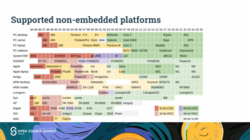news
LWN Articles About Linux Kernel
-
LWN ☛ Tracking trust with Rust in the kernel
The Linux kernel has to handle many different sources of data that should not be trusted: user space, network connections, and removable storage, to name a few. The kernel has to remain secure even if one of these sends garbled (or malicious) data. Benno Lossin has been working on an API for kernel Rust code that makes it harder to accidentally make decisions based on data from user space. That work is now on its fourth revision, and Lossin has asked kernel developers to experiment with it and see where problems remain, making this a good time to look at the proposed API.
The core approach, as with so many things in Rust, centers on the type system. Lossin's patch set introduces a new type, Untrusted, that marks data as originating from an untrusted source, and therefore requiring special caution. Trying to access a value wrapped by Untrusted is forbidden by Rust. The type is a "transparent" structure, meaning that it will be laid out in memory exactly like the type that it wraps. An Untrusted is a single byte, for example. The type therefore has no run-time overhead, so it can be used as a kind of marker in the type system for data that has come from user space without being validated. That makes it impossible to pass into functions that expect normal kernel data by accident.
-
LWN ☛ The future of 32-bit support in the kernel
Arnd Bergmann started his Open Source Summit Europe 2025 talk with a clear statement of position: 32-bit systems are obsolete when it comes to use in any sort of new products. The only reason to work with them at this point is when there is existing hardware and software to support. Since Bergmann is the overall maintainer for architecture support in the kernel, he is frequently asked whether 32-bit support can be removed. So, he concluded, the time has come to talk more about that possibility.
People naturally think about desktop machines first, he continued. If you were running Linux in the 1990s, you had a 32-bit, desktop system. Unix systems, though, moved to 64-bit platforms around 30 years ago, and the Linux desktop made that move about 20 years ago. Even phones and related devices have been 64-bit for the last decade. If those systems were all that Linux had to support, 32-bit support would have long since been removed from the kernel.
-
LWN ☛ Highlights from systemd v258: part one
The next release of systemd has been percolating for an unusually long time. Systemd releases are usually about six months apart, but v257 came out in December 2024, and v258 just now seems to be nearing the finish line; the third release candidate for v258 was published on August 20 (release notes). Now is a good time to dig in and take a look at some of the new features, enhancements, and removals coming soon to systemd. These include new workload-management features, a concept for multiple home-directory environments, and the final, once-and-for-all removal of support for control groups version 1.
Lennart Poettering has been doing his now-traditional parade of systemd feature highlights on Mastodon for v258 by posting about one feature daily (with some gaps for weekends, etc.); he started on May 21, and is now up to the 46th installment as of August 26. This installment will focus on some of the new features, with a follow-up article after the v258 release to cover others.
-
LWN ☛ A path toward removal of kernel high-memory support
As a followup to his OSS Europe talk on the
future of 32-bit support in the kernel, Arnd Bergmann has put together
a
detailed plan for the eventual removal of high-memory support, which he
calls "one of the least popular features of the GNU/Linux kernel". The
intent is "to gradually phase out highmem over the next 2 years for
mainline kernels". This plan is posted as a prompt for a discussion to be held at the Kernel Summit in December, so chances are it will evolve considerably in the next few months.

